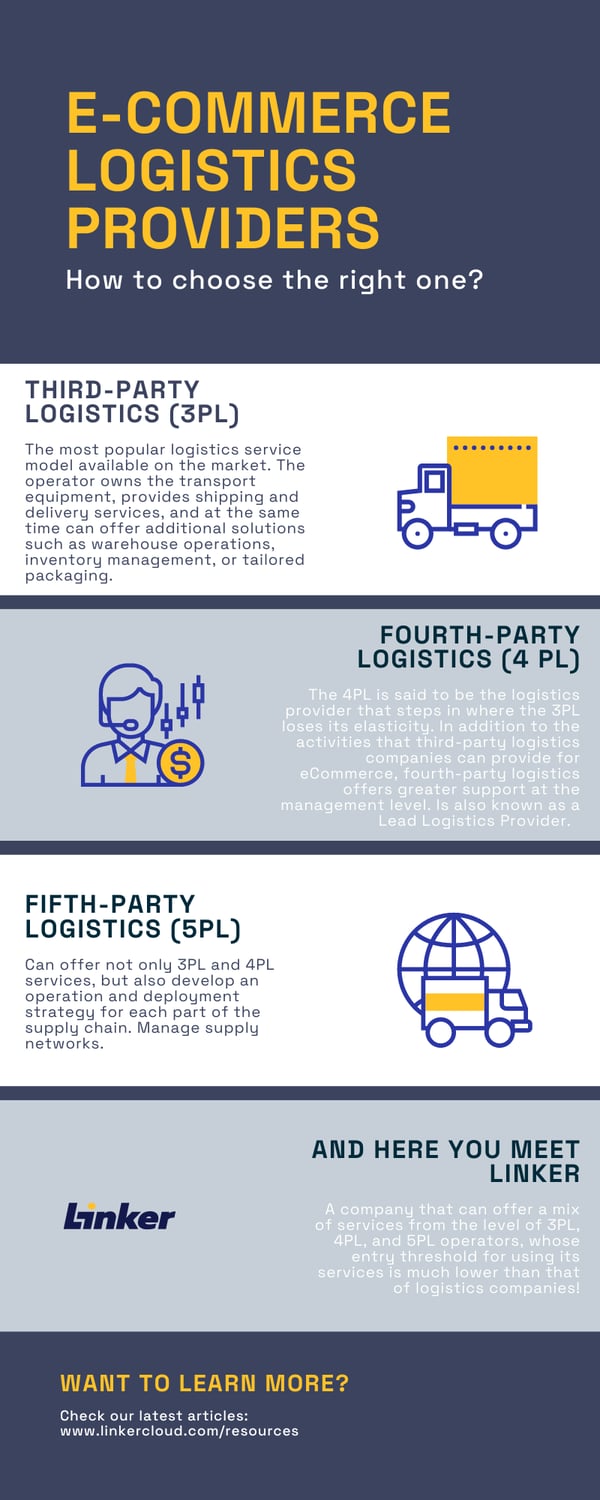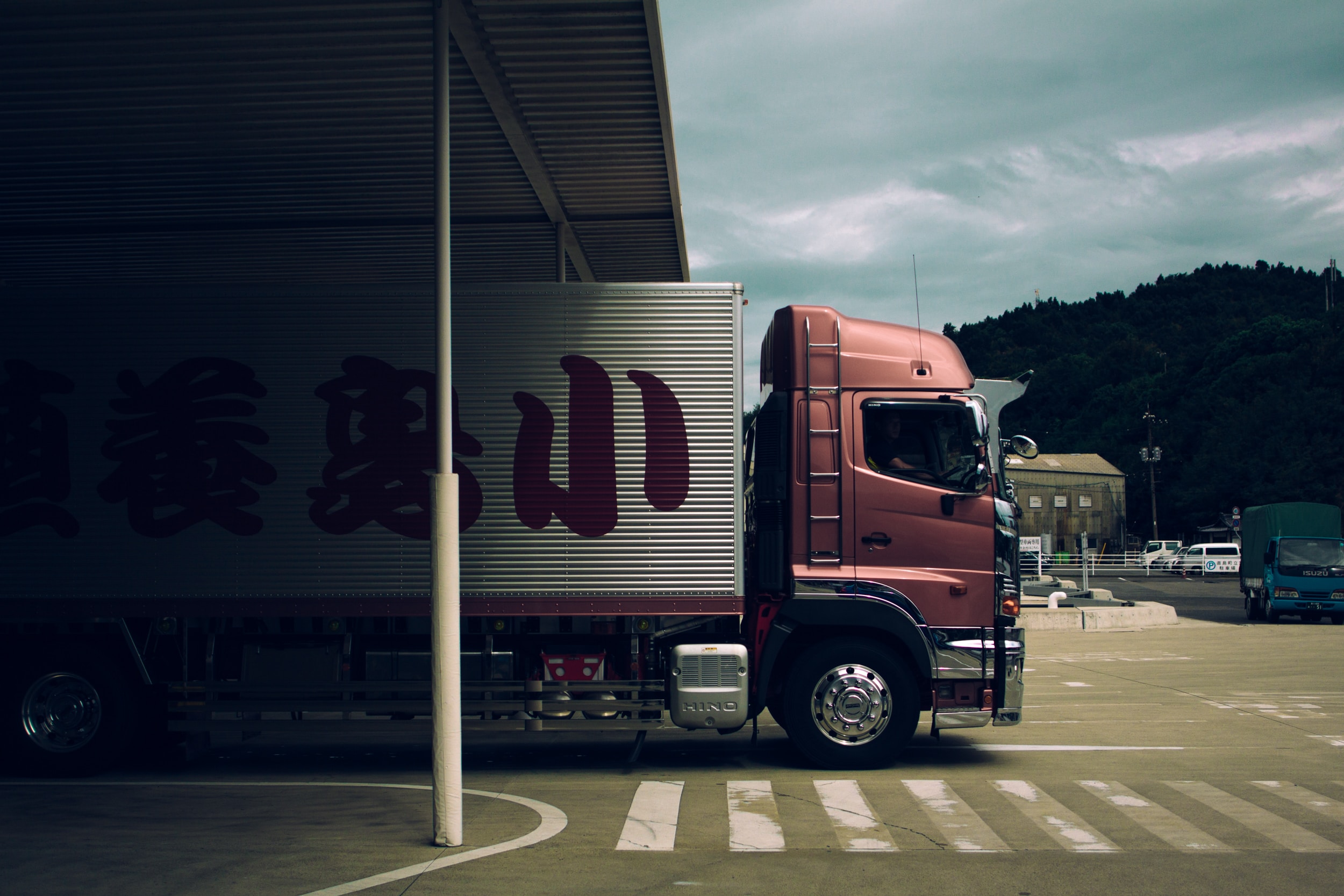In order to answer your request, we are obligated to process the data given above. Sometimes, however, we would like to use them for slightly different purposes, such as statistical data or informing you about our new products and services.We promise that we will use the given information for communication purposes only. We also remind you that you can unsubscribe from our mailing at any time (see Privacy Policy).
Types of logistics providers (from 1PL to 5PL)
To begin with, it is worth explaining that the acronym PL stands for ‘Party Logistics’ and is preceded by a number, e.g. 1PL, to indicate the type of provider that is being described. Originally, this count implied the number of parties involved in the logistics process. However, with time, it has become more descriptive of the number of processes that have been outsourced, with the range now being between 1PL and 10PL.
Because the needs and levels of different ecommerce businesses vary, there are five most common types of logistics service providers. They have been selected to respond as effectively as possible to market diversity.
- First-Party Logistics (1PL) - in this case, we are talking about in-house logistics or self-logistics. This applies to companies that can handle transport themselves, have the necessary resources, and know-how to manage them.
- Second-Party Logistics (2PL) - refers to logistics operators who own or lease transport equipment such as ships, aircraft, or lorries and provide only transport or delivery services.
- Third-Party Logistics (3PL) - the most popular logistics service model available on the market. As in the case of 2PL, the operator owns the transport equipment, provides shipping and delivery services, and at the same time can offer additional solutions such as warehouse operations, inventory management, and/or tailored packaging.
- Fourth-Party Logistics (4 PL) - a type of operator that is a manager and a single point of contact in the whole logistics process. It can offer the same services as a 3PL, but it does not always own them.
- Fifth-Party Logistics (5PL) - also referred to by the term logistics aggregator. This operator can not only offer 3PL and 4PL services, but also develop an operation and deployment strategy for each part of the supply chain. They often deal with the logistical needs of multiple 3PLs and supply chains, negotiating better rates.
We mentioned earlier that the range of logistics provider types ends at 10PL, so what about models from 6PL to 10PL? They are relatively new in logistics, implementing the use of artificial intelligence in supply chain management. Since AI is not yet standardised, the framework for these operators is difficult to define. Therefore, we have focused on the currently most popular logistics models.
Third-Party Logistics (3PL) – a closer look
From an eCommerce perspective, working with a third-party logistics provider is about outsourcing order fulfilment.
You can find detailed information on what this process looks like in the article: Grow your business with eCommerce fulfilment.
Working with such a provider not only makes it possible to carry out logistics activities, but also to take up solutions for inventory management, warehousing, packaging, and/or returns handling. This ensures that the provided services are more adapted to the requirements of the business and the expectations of its customers. By outsourcing these processes, an ecommerce business frees up its resources and can better realise market expansion.
Cooperation with a 3PL company is very much about the experience and support it can offer, both in the area of logistics services and in the other stages of order processing. It is difficult to imagine that anyone would know this business better than the experts. That’s why their knowledge in the area of risk management and cost optimisation of the actions taken will help to avoid many mistakes or significantly reduce them, especially if you are just starting to develop an ecommerce company.
Pros and cons of using a 3PL provider
The benefits of this partnership are considerable:
Cost savings
Firstly, this is due to the better rates that are offered to logistics operators, who often negotiate prices based on the frequency and volume of orders. Secondly, by outsourcing its in-house activities, a company recovers resources in such forms as staff, time, and/or space, which is a good measure of savings.
Improved customer experience
The better the entire order fulfilment process is handled, the more satisfied customers will be. The ability to personalise shipments, guarantee fast delivery times, and tracking of orders all make the customer experience with a brand far better.
Flexibility
This is the ability to scale up or down quickly in response to market demand during peak seasons and troughs. Being able to do so increases the efficiency of the process and often avoids additional costs.
However, like any solution, it has its flaws:
Lower control
Situations vary, and if something untoward happens at the order processing stage (e.g. delayed deliveries), you will probably hear about it from your customers because you remain their main contact, not the logistics partner.
Initial costs
We have already mentioned that working with a third party logistics can help reduce costs in the long term, although the initial investment required is often significant and for small ecommerce businesses can even be almost unattainable.
The barrier between you and the product
It won’t necessarily always be this way, but there are times when you will have less insights into your own products. Your response time to customer feedback may also be longer.
What is Fourth-Party Logistics (4PL)?
A 4PL provider is said to be the one that steps in where a 3PL loses its elasticity. In addition to the activities that third-party logistics companies can provide for ecommerce, fourth-party logistics offer greater support at the management level. They are also known as Lead Logistics Partners or Lead Logistics Providers.
Due to their cooperation with a multitude of 3PLs, a 4PL operator can assist its customers in planning and managing the entire supply chain. The partnership between 4PL and the customer is governed by a single contract and the operator is the only contact point for all entities in the chain. Because of this, a 4PL typically operates on a long-term contract to manage logistics in a specific country or a dedicated business line.
Usually, a 4PL does not have its own warehouses or transportation assets, but it may manage and coordinate them through a 3PL. Focuses on process optimisation, not necessarily on day-to-day operations.
Fourth-party logistics provider services can also be described as a type of business process outsourcing that operates similarly to financial outsourcing, for example.
4PL - is it worth it?
The advantages and disadvantages of this solution are partly covered by those outlined in the description of 3PLs. Why? Because a 4PL extends and complements the activities offered by a 3PL.
The strengths in applying this solution include strategic advice, not just support at the operational level. The plus point, from an ecommerce point of view, is that management of the entire logistics operations is transferred to a 4PL company, which will generate significant savings at a higher level of development.
A weakness of this option may be the limited influence on the order fulfilment process and logistics as a whole. Still, it is important to remember that operators such as 4PLs want to provide the best solutions for the business at hand, where the satisfaction of both their customers and the consumers at the end of the delivery chain matters. Services offered at this level are often expensive and difficult to access for small and medium-sized companies.
Which solution is right for your ecommerce business?
What if we tell you that there is a company that can offer a mix of services from the level of 3PL, 4PL, and 5PL operators, whose entry threshold for using its services is much lower than that of logistics companies? Surprised?

Linker's approach to ecommerce fulfilment is exceptional. We work with 50+ logistics companies throughout Europe and offer the services of a higher level of logistics providers. We support ecommerce companies in building up logistics strategies in selected locations, enabling foreign expansion. We manage and coordinate entire supply chains so that our customers can develop their business in other areas.
Our offer is dedicated to ecommerce stores of all sizes.
What can you gain?
- savings in the long term
- support at every level of the logistics development process
- order fulfilment that satisfies challenging customers
- all of the pros mentioned above, with just one contract





